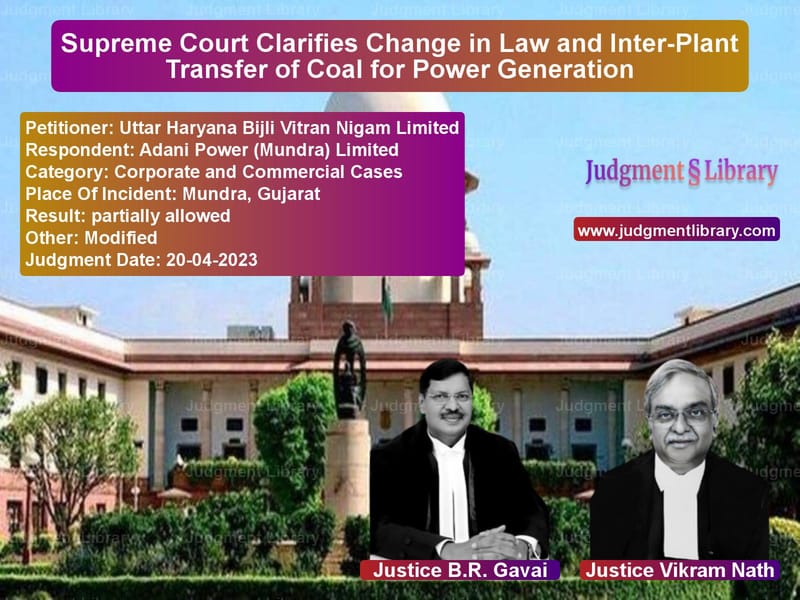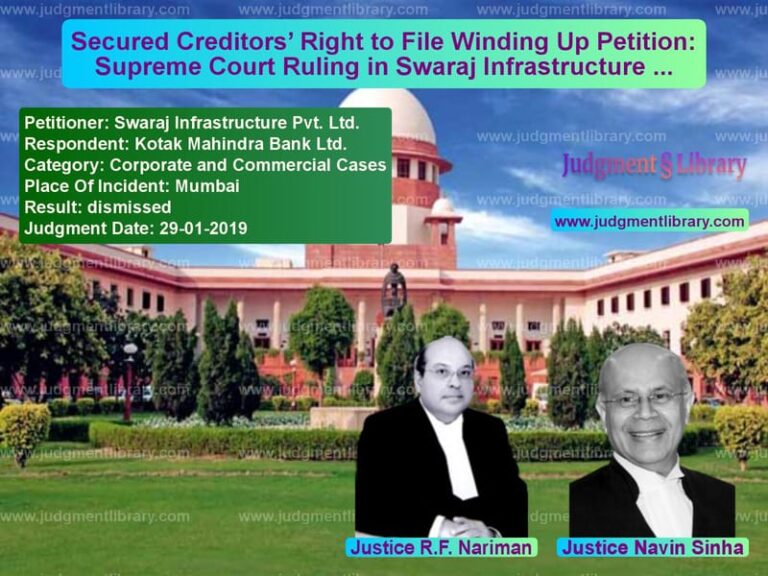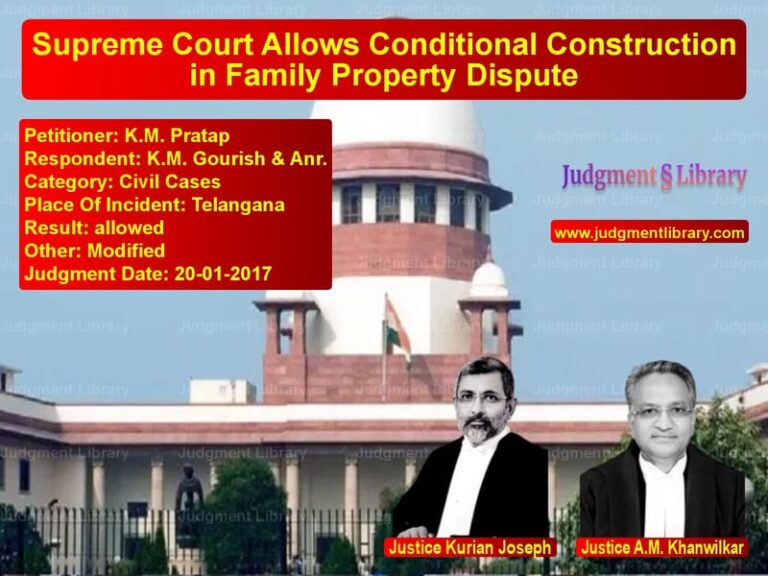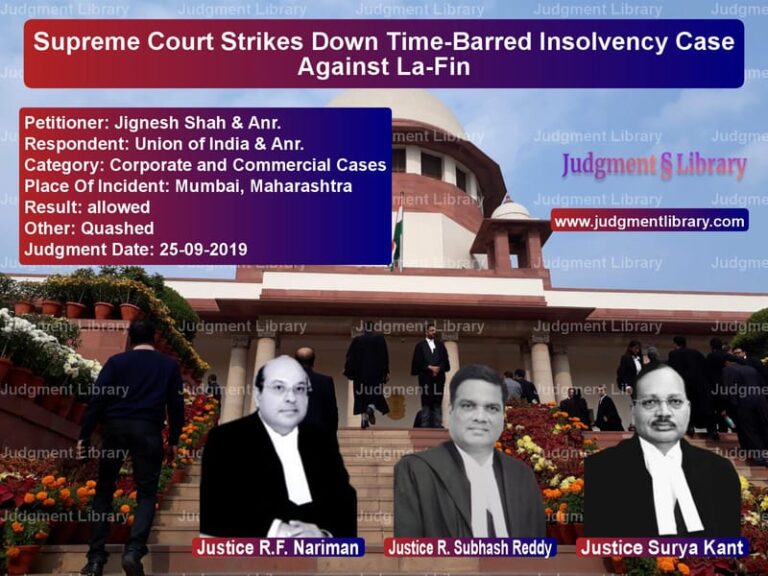Supreme Court Clarifies Change in Law and Inter-Plant Transfer of Coal for Power Generation
The Supreme Court of India, in its landmark judgment delivered in the case of Uttar Haryana Bijli Vitran Nigam Limited and Another vs. Adani Power (Mundra) Limited and Another, clarified significant aspects of the Change in Law under the Power Purchase Agreements (PPAs), particularly in the context of inter-plant transfer (IPT) of coal. The case revolved around whether the communication dated 19th June 2013 issued by Coal India Limited (CIL) allowing IPT should be treated as a ‘Change in Law’ event under the PPAs for electricity supply. The Court addressed the issues regarding the impact of the New Coal Distribution Policy (NCDP) 2013, the transportation cost savings, and the adjustments to be made for ‘Change in Law’ relief.
Background of the Case
The respondent, Adani Power (Mundra) Limited (APML), had established a generating station of 4620 MW capacity at Mundra, Gujarat, under a Power Purchase Agreement (PPA) with Haryana Utilities, namely Uttar Haryana Bijli Vitran Nigam Limited (UHBVNL) and Dakshin Haryana Bijli Vidyut Nigam Limited (DHBVNL). APML claimed that the changes in coal distribution under the NCDP 2013, along with the decision of Coal India to allow IPT, resulted in increased operational costs that warranted compensation.
In this case, APML filed a petition with the Central Electricity Regulatory Commission (CERC) claiming compensation for the shortfall in domestic coal supply and for the taxes and duties imposed, which it contended were caused by changes in law. Haryana Utilities disputed the claims, particularly focusing on the coal inter-plant transfer (IPT) arrangement and its impact on the cost calculation and compensation claims.
Key Legal Issues
1. Whether the IPT of coal constitutes a ‘Change in Law’ under the PPA.
The Court had to examine whether the communication from Coal India dated 19th June 2013, which allowed inter-plant transfer of coal, could be regarded as a ‘Change in Law’ event under the PPAs between APML and Haryana Utilities.
2. Whether the compensation related to the taxes and duties should be granted based on actual coal supply or normative coal requirements.
The Court needed to determine whether compensation for the shortfall in domestic coal should be calculated based on the actual coal supplied or on the normative quantity outlined in the PPAs.
3. Whether the new coal distribution policy should be applied to claims for relief under ‘Change in Law’ provisions.
APML sought to claim compensation under the ‘Change in Law’ provisions, arguing that the coal distribution system had been altered in a way that adversely affected the operational cost of generating power for Haryana Utilities.
Arguments Presented
Petitioners (Uttar Haryana Bijli Vitran Nigam Limited and Others) Arguments
- They argued that the decision to allow IPT by Coal India was not a ‘Change in Law’ under the terms of the PPAs.
- The letter dated 19th June 2013 was an internal communication that did not have the force of law and did not constitute a legal change.
- The claim for compensation based on the taxes and duties incurred due to the change in the coal distribution policy was unjustified as the arrangements were contractual and were part of the agreed terms in the PPA.
- The benefit of IPT coal should have been passed on to the Haryana Utilities and ultimately to the consumers.
Respondents (Adani Power (Mundra) Limited) Arguments
- They argued that the communication from Coal India permitting IPT was a government action and should be recognized as a ‘Change in Law’ under the PPAs.
- The taxes and duties incurred due to changes in the coal distribution policy were unforeseen at the time the PPAs were signed and should be compensated for under the ‘Change in Law’ provisions.
- The reduction in transportation costs due to IPT should be considered when calculating compensation, as it directly affected the operational cost of power generation.
- Since the change in coal distribution was mandated by the government and affected the supply of coal, it should be treated as a ‘Change in Law’ event.
Supreme Court’s Observations
The Supreme Court, led by Justices B.R. Gavai and Vikram Nath, made the following key observations:
- The definition of ‘Law’ in the PPA is broad enough to include government policies, circulars, and communications from instrumentalities of the government.
- The communication dated 19th June 2013 issued by Coal India falls within this definition of ‘Law’ because it resulted from a government decision that altered the coal distribution policy.
- The Court noted that the supply of coal, whether by IPT or otherwise, affects the cost of power generation and must be considered when determining compensation for the change in law.
- Coal India’s communication provided a new mechanism for coal transfer between plants, which directly impacted the operational costs for APML. Therefore, it constitutes a change in the law for the purposes of compensation under the PPAs.
- The Court also acknowledged that the benefits of cost savings due to IPT should be passed on to the Haryana Utilities and consumers.
The Court stated:
“A change in the mechanism that governs coal distribution, especially one backed by a government notification, cannot be treated as anything other than a Change in Law. This change directly impacts the cost of power generation and must be accounted for in the compensation due.”
Final Judgment
The Supreme Court ruled as follows:
- The finding of the Appellate Tribunal for Electricity (APTEL) that the communication dated 19th June 2013 allowing IPT is not a ‘Change in Law’ was set aside.
- The Court held that IPT constitutes a ‘Change in Law’ under the provisions of the PPA and must be considered when calculating compensation.
- The case was remitted back to CERC to calculate the benefits accruable due to the change in coal transfer arrangements, with notice to other distribution companies, including MSEDCL and Rajasthan DISCOMS.
Implications of the Judgment
This ruling has significant implications for the power sector, particularly in the context of Change in Law claims:
- Impact on Coal Supply Mechanisms: The judgment underscores the importance of government decisions and policies regarding coal distribution and their impact on contractual obligations in PPAs.
- Coal Distribution and Cost Allocation: The decision sets a precedent for how cost savings due to IPT coal should be calculated and passed on to consumers, thus benefiting end-users.
- Guidance for Future Cases: The Court’s ruling clarifies the legal interpretation of ‘Change in Law’ in the power sector, which will influence future disputes and compensation claims in similar contexts.
Conclusion
The Supreme Court’s ruling in Uttar Haryana Bijli Vitran Nigam Limited vs. Adani Power (Mundra) Limited provides much-needed clarity regarding the definition and scope of ‘Change in Law’ in power purchase agreements. By recognizing the communication from Coal India as a Change in Law event, the Court has ensured that power companies like APML receive compensation for increased operational costs due to policy changes. This judgment highlights the critical balance between regulatory changes, contractual obligations, and the need to protect the interests of consumers in the electricity sector.
Petitioner Name: Uttar Haryana Bijli Vitran Nigam Limited.Respondent Name: Adani Power (Mundra) Limited.Judgment By: Justice B.R. Gavai, Justice Vikram Nath.Place Of Incident: Mundra, Gujarat.Judgment Date: 20-04-2023.
Don’t miss out on the full details! Download the complete judgment in PDF format below and gain valuable insights instantly!
Download Judgment: uttar-haryana-bijli-vs-adani-power-(mundra)-supreme-court-of-india-judgment-dated-20-04-2023.pdf
Directly Download Judgment: Directly download this Judgment
See all petitions in Commercial Arbitration
See all petitions in Enforcement of Awards
See all petitions in Settlement Agreements
See all petitions in Judgment by B R Gavai
See all petitions in Judgment by Vikram Nath
See all petitions in partially allowed
See all petitions in Modified
See all petitions in supreme court of India judgments April 2023
See all petitions in 2023 judgments
See all posts in Corporate and Commercial Cases Category
See all allowed petitions in Corporate and Commercial Cases Category
See all Dismissed petitions in Corporate and Commercial Cases Category
See all partially allowed petitions in Corporate and Commercial Cases Category







